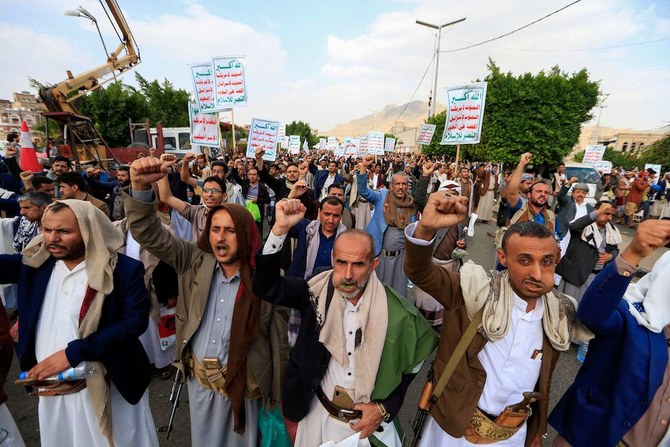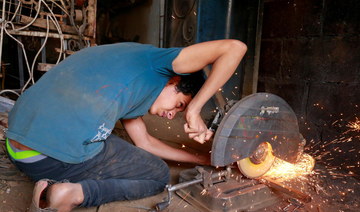CHICAGO: US Special Envoy to Yemen Tim Lenderking on Monday accused the Houthi militia of preventing a cease-fire in Yemen by manipulating the price of fuel and through their military offensive in the country’s gas-rich Marib region.
Lenderking, joined by Sarah Charles, USAID assistant administrator for the Bureau for Humanitarian Assistance, told reporters that the US was increasing its humanitarian aid to the war-torn country by $165 million dollars, calling the situation in Yemen “dire, and one of the worst humanitarian crises in the world.”
The two Biden-appointed officials welcomed the decision by the UN Security Council to name Swedish diplomat Hans Grundberg as new UN envoy to Yemen. But they acknowledged that despite continued humanitarian efforts, Iran’s subversive relationship in backing the Houthis was prolonging the six-year conflict.
“There is of course a relationship between Iran and the Houthis that is not helpful to the Yemen conflict. In terms of Iran … I haven’t seen anything on the ground that leads me to believe the Iranians are prepared for a constructive role,” Lenderking said.
“We of course would welcome that. We would love to see that. Those of us who work on Yemen and see the intense suffering. We do not want to see the Yemen process held up by the Iranians or by the negotiations that have been taking place on the JCPOA. The Yemeni situation is urgent.”
Lenderking added: “We call on Iran to play a constructive role. Stop fueling the war effort through the provision of equipment, know-how and training that is only perpetuating the conflict. At the same time, if the Houthis understand the world current, they would do well to lessen their relationship on Iran and turn to others who are willing to support their presence inside Yemen and ensure their voices are heard in the political process.”
Lenderking and Charles praised Saudi Arabia and urged the Kingdom to lift fuel restrictions that are intended to prevent the Houthis from manipulating prices and funding their violence against Yemen and the Saudi coalition.
“It is very important for the Saudis to be fully engaged and constructive and it is one reason why I am in Saudi Arabia very often talking to the leadership. They are major actors, major donors through King Salman’s humanitarian center. We appreciate the donations and the funding the Saudis have provided, at the same time we are going to see more as I have stressed,” Lenderking said.
“What I do sense from the Saudis is a genuine desire to end the conflict. That doesn’t mean there is complete alignment on everything and we need to continue to narrow those gaps where we can. There has been a lot of constructive engagement from Saudi Arabia. I see that their efforts are continuing.”
Lenderking said that he is in discussions with the Kingdom to lift fuel restrictions in Yemen’s ports.
“That is something the Saudis can help us with. That the Yemeni government can help us with. It’s very important that that happens so that we do not face problems with the fuel restrictions,” Lenderking said.
“The fuel is vital to everything that Sarah and I are talking about. It goes to power mills that produce food. It goes to hospitals. It goes to the transportation network that Yemenis rely on. The humanitarian workers who are bravely out there in Marib need the fuel to power their activities. There should be no restrictions whatsoever on movement of fuel into the ports. That is something that I have had as an envoy in conversation with Saudi Arabia.”
Both officials criticized the Houthis, and slammed the militia for “fueling the conflict.”
Lenderking said: “At the same time, the fuel, once it arrives into Yemen, must be distributed in a way so that no party, including the Houthis, takes advantage of it or stockpiles it, and as Sarah and I have mentioned, it drives up black market prices and that is a way that people profit from the war in a way that is unconscionable.”
Charles said that the Houthis were killing civilians in the Marib offensive, which has threatened to displace hundreds of thousands more civilians and aggravate the humanitarian crisis even further, but that funding from donors is preventing the crisis from turning into a full-scale famine.
“The situation in Yemen is dire, one of the worst humanitarian crises in the world,” Charles said. “Two-thirds of the country needs humanitarian assistance, that’s more than 20 million Yemenis who struggle every day to survive without basic necessities, including more than 2 million young children facing deadly non-nutrition this year alone.”
The US is the largest single donor of humanitarian aid to Yemen, contributing more than $3.6 billion since the country’s conflict began in 2015.
Lenderking said that the humanitarian fund “is dangerously low” and urged regional donors to contribute more. He said the humanitarian crisis in Yemen is closely linked to economic problems in Yemen and that together they are fueling the conflict.
“Yemen continues to face the threat of mass famine and humanitarian assistance is critical to preventing this. We also believe that taking immediate steps to mitigate the humanitarian effects and save lives can contribute to progress on the peace process,” Lenderking said.
“The US remains the largest single donor to humanitarian assistance for the Yemeni people, providing more than $3.6 billion since the crisis began to alleviate suffering. Obviously, the US can’t do this alone, so other donors, particularly regional donors, must step up their contributions.
“The UN humanitarian appeal remains dangerously underfunded. We look forward to addressing this at the UN General Assembly in September and hope to see additional funding commitments that cannot wait.”



























